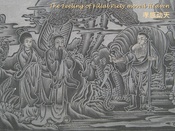"The Concept of Filial Piety" Filial piety is the primary element in the Chinese religion, both in the past and the present. During the Chou dynasty, families began to honor their ancestors more and more. They placed tablets or plaques for their ancestors in temples that were set apart for honoring their name and family. The temples, however, were used for more than for that one purpose. The Chinese believed that their ancestors should be a part of or watch over the major decisions or happenings that were to be made.
They held ancestrial rights, proposal of marriages for daughters, and prayer during the spring and autumn festivals and special anniversaries.
The father always led the ancestral ceremonies, but their were officials who knew the precise form of the ritual. They were only the advisors to the head of the family. The personator, who was always at the ceremonies and who was a member of a family that was supposed to have an ancestral spirit within them, gave blessings, accepted gifts for the ancestor, and ate and drank the family's offerings.
Sacrificial offerings however were also part of filial piety, but it was considered a much larger or brouder system. The offerings were to earth because fertal soil and strong family ties were the insurence for life to continue, but the offerings were usually defined as devotion and obedience from the younger to the older members of the family. Throughout their lives, sons would be very devoted to their fathers as would younger brothers to their older brothers. It was said to be more disgraceful to dishonor an elder than a highly dangerous criminal. Senior members received the highest amount of respect and authority throughout the family, but in addition to that, they were also expected to give that amount of respect in return and in an appropriate way. The authority of the elders gave them the right to arrange marriages, because marriage to them was for the purpose of continuing the family line and keeping it strong. Obedience to the senior members in life and in thier death became the two essential aspects of filial piety.
Romantic love was only found occasional thoughout all the marriages that were arranged. Women had no choice or say over who they were to be married to, and they were required to serve the men. Their first duty was to proclaim loyalty to her husband's family by sacrificing to his ancestors as was done by her mother-in- law before her.
Filial piety was always a part of everyday life for the Chinese. Although there have been religions that have emerged as China began to grow and prosper, but the primary element of filial piety will always be a part of them.




